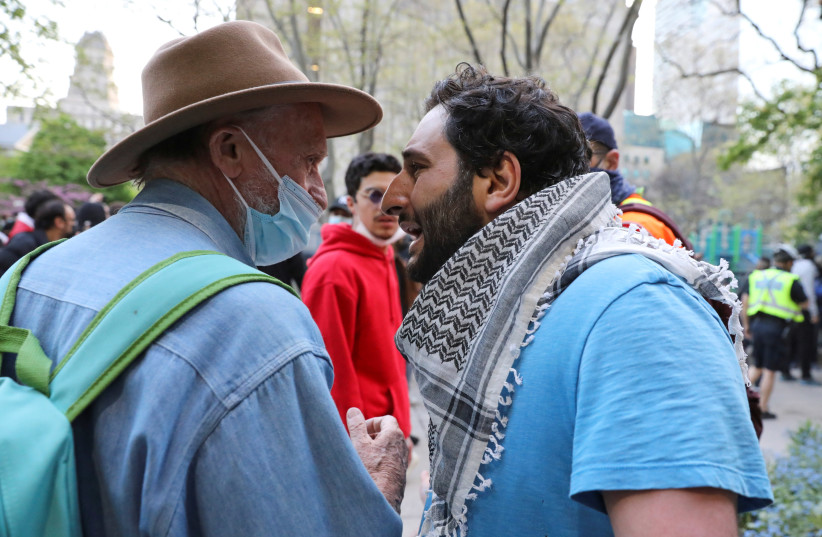Pramila Patten, the UN special representative of the secretary-general on sexual violence in conflict, briefed the Security Council this week on her findings in the report on sexual violence used by Hamas on October 7, revealing the “clear and convincing information” that some hostages taken by Hamas were subjected to sexual violence.
She said that the horrific actions of October 7 do not justify Israel’s military campaign to destroy Hamas, which is an unjustified act of “collective punishment” against the Palestinian people in Gaza, which has “left tens of thousands of Palestinians killed and injured” and “entire communities facing inhumane conditions, including famine and disease.”
She expressed horror at women and children in Gaza being killed by “countless bombs, gunfire.”
“With every bomb that drops the world becomes more unjust, and the road to peace more clouded,” she said.
The distinction Patten makes here is legitimate.

While her claims that Israel is consistently and unnecessarily murdering Palestinians are inaccurate, she hermetically separates between the recognition of the horrors of October 7 and support for the Palestinian people.
The Left and the Right both want you to believe in extremes
That is because those two things are not mutually exclusive, as many would have you believe today, both on the Right and Left.
Those on the Right see anyone who supports the right of the Palestinian people to live peacefully as a suggestion that Palestine must rise from the ashes of Israel. While some may genuinely believe that – and that is a disgusting narrative that must be nipped in the bud – the vast majority support a two-state solution.
Whether that may be a probable end to the Israeli-Palestinian conflict is less relevant currently; instead, it is the intent for both Palestine and Israel to exist that defines a desire for peaceful coexistence.
On the other side of things is the Left, which screams – you guessed it – “From the river to the sea, Palestine will be free.” This slogan, too, expresses that this form of pro-Palestinian activism is inherently opposed to the existence of the State of Israel.
It is saddening, indeed, to see many who do not know which river or sea are spoken of, not knowing that they are calling for the land of Israel to be wiped out.
Absolutism is loud, but that doesn't make it popular
But these two narratives are the loudest, not the most common. The vast majority of the international crowd supports both Palestinians and Israelis. Forcing these two stances into a dichotomy forces people to choose, and given the complex yet ever-existent power imbalance that exists, they tend to side with Israel’s opponent.
Instead of focusing on how these two stances may oppose one another, let us look at how they can go hand-in-hand. Of course, this does not include every single person in either population. There will always be fluctuation, but the two sides can converge at the top of the bell curve – where the majority presides.
We must be consistent regarding the right to self-determination. We claim it to be justifiable because we have a shared past and future; we have grown together through defining experiences and found refuge in our country, protected by our people.
But if we are to be true about this principle, we must also acknowledge that the Palestinian people, even if they did not exist 150 years ago, do exist now and have existed for some time.
Their shared experiences, future, and refuge in a homeland are facts. If we demand our rights, we must acknowledge that they also have a claim, and vice versa. Recognizing their right does not deny us our rights but instead maintains consistency.
Israel has seen lost generations. Budgets that could uphold a country are spent on security. The conflict is as all-consuming as a wall of flames, blocking us off from the rest of the liberal world with which we are so closely connected. It consumes our time and resources, and the solution depends on shared prosperity.
Post-World War II Europe enjoyed this connection; it survived due to economic cooperation, such as the creation of the European Union. Like a never-ending loop, cooperation is the key to prosperity, and prosperity is the key to cooperation. This applies to the Israeli-Palestinian conflict, too.
I do not share this opinion from a place of naivety. It is a reality we must accept as soon as possible. Conceding to either extreme side will only prolong this exhaustive, draining, and murderous stalemate in which both sides ultimately lose.
The moment we are capable of dialogue beyond catchy slogans is when we are free of the burden of society-defined opinion camps and can instead sit down and do the work – real work – that could bring peace and prosperity to both populations. One nation does not come at the expense of the other. Instead, we live in a reality where both are needed to survive.
The writer is managing editor of The Jerusalem Post’s website, JPost.com.
